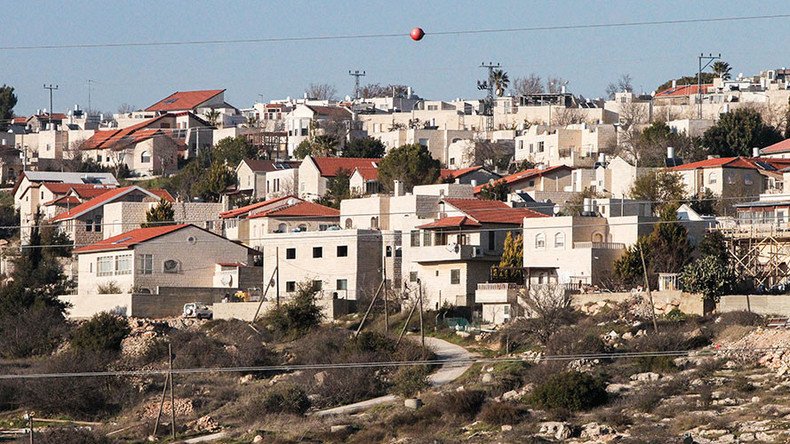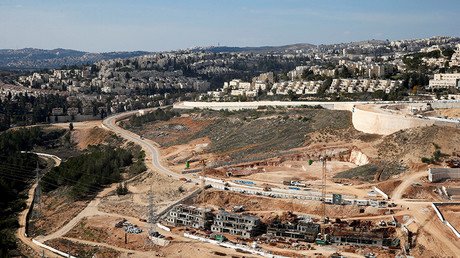Israeli MPs vote to legalize 4,000 settler homes in West Bank amid ‘annexation’ outcry

The Israeli parliament has greenlighted the legalization of nearly 4,000 settler homes in Area C of the West Bank as it passed a controversial retroactive bill. Prior to its approval, the bill was likened to annexation and blasted by Israel’s attorney general.
The highly controversial legislation, which challenges both international and Israeli law, was backed by 60 Knesset deputies and opposed by 52 on Monday. The so-called Regulation Bill has sparked heated debate with voting having been postponed several times. The bill has drawn widespread condemnation from the opposition, the UN and also the state prosecutor’s office.
#Israel's parliament passes bill retroactively legalizing thousands of West Bank settlements @SimoneReportspic.twitter.com/Iuz7VcCYir
— RT America (@RT_America) 6 февраля 2017 г.
Attorney-General Avichai Mandelblit has repeatedly voiced his concerns over the bill’s compliance with international norms, saying it is in violation of Israel’s constitution and international law, while refusing to defend the bill before Israel’s High Court of Justice (HCJ). He also warned that Israel might face legal action from the International Court of Justice once the bill is enacted.
The law covers Israeli settlements and outposts built on private Palestinian land in the Area C of the West Bank. Outposts, the settler homes not approved by the government, are deemed illegal under Israeli law. Pursuant to the new law, the settlers will be allowed to remain on the Palestinian private land if they had no previous knowledge that it had been owned by Palestine or were instructed by the government to build homes there. The law also envisages compensation for Palestinian owners, who will be paid a market share for their land but will not be able to sell it.
‘Barbaric, limitless, unrestrained theft of land’
The Knesset opposition leader, Isaac Herzog, of the center-left Zionist Union, labeled the new legislation a “de-facto annexation,” as cited by the Jerusalem Post.
“Never in the history of Israel has the Knesset passed a bill against state laws and against the senior legal advisers of the government,” Herzog said ahead of the vote, calling the bill a “catastrophe” and an “acute danger to the State of Israel,” which might land it in the Hague international tribunal.
Herzog urged Defense Minister Avigdor Lieberman, a long-time ally of PM Benyamin Netanyahu, to withdraw support from the “illegitimate law,” from which “we will suffer from for many generations to come,” he said, as cited by Arutz Sheva.
Activist and author Miko Peled told RT’s Alexander Rubinstein that the bill puts a final nail into the idea that a two-state solution is possible.
“The two-state solution has been dead for decades. This just puts it in legal form. It’s a formality because Israel has already been taking land from the Palestinians for Jews only. Now it’s on the books and it’s formal, but the reality is the same,” said Peled, adding that “there’s no question” the international court will open legal proceedings against Israel after what he described as the “barbaric, limitless and unrestrained theft of land.”
READ MORE: Israeli settlements not ‘impediment’ for peace, just ‘not helpful’ – White House
It is not yet clear if the law will come into force, as it can be thwarted by judicial authorities. Lieberman himself believes there that the “chance that it will be struck down by the Supreme Court is 100 percent,” as cited by I24news.
The UN Special Coordinator for the Middle East Peace Process, Nickolay Mladenov, stated the law is set to deal another blow to the peaceful resolution of the Israeli-Palestinian conflict, saying that its adoption will entail “far reaching legal consequences for Israel and greatly diminish the prospects for Arab-Israeli peace.”
The bill was hailed as a major victory by the right-wing nationalist parties. Naftali Bennet, Israel’s education minister and the leader of the Jewish Home party, which has been championing the legislation, called its approval a “revolution” in a Twitter post.
“Our determination paid off,” Bennet said, while commending Netanyahu for his support of the bill.
There has been widespread speculation about the actual stance of the Israeli PM toward the bill. Although Netanyahu publicly voiced his support for the legislation, there have been reports he initially opposed it, fearing international repercussions, but in the end caved in to pressure from his coalition partners, Jewish Home.
Protests against @netanyahu's UK visit are set to take place in London today. https://t.co/d43pIc3mHc
— RT UK (@RTUKnews) February 6, 2017
Netanyahu, who has been the subject of an ongoing criminal probe into abuse of power and corruption, was not present at the vote, as he was still on the way back from his state trip to the UK. Dismissing rumors that he intended to postpone a vote until a meeting with US President Donald Trump, scheduled on February 15, had taken place, Netanyahu argued that he had only wanted to “update” the US on the move.
“I never said I want to put it off,” he told journalists in the UK on Monday, as cited by the Times of Israel.
“I act according to national interests. In my view, you don’t surprise friends. Friends don’t surprise each other. Friends update each other. That’s what I did,” he said.
The Israeli ruling coalition, including Netanyahu’s Likud and Jewish Home, reinforced its push for the bill, first proposed in November, following recent evacuation and demolition of Amona’s settlement, an Israeli outpost in the West Bank which triggered mass protests. The outpost was erected in 1995 and was ruled illegal by the Israeli Supreme Court in 2006.
Last week, Israel approved the construction of over 3,000 settler homes in the West Bank in addition to some 2,500 housing units announced the week before.
Lieberman claimed the decision was aimed at “resumption of normal life in Judea and Samaria, and in order to provide a real answer to living and housing needs in the region.”














